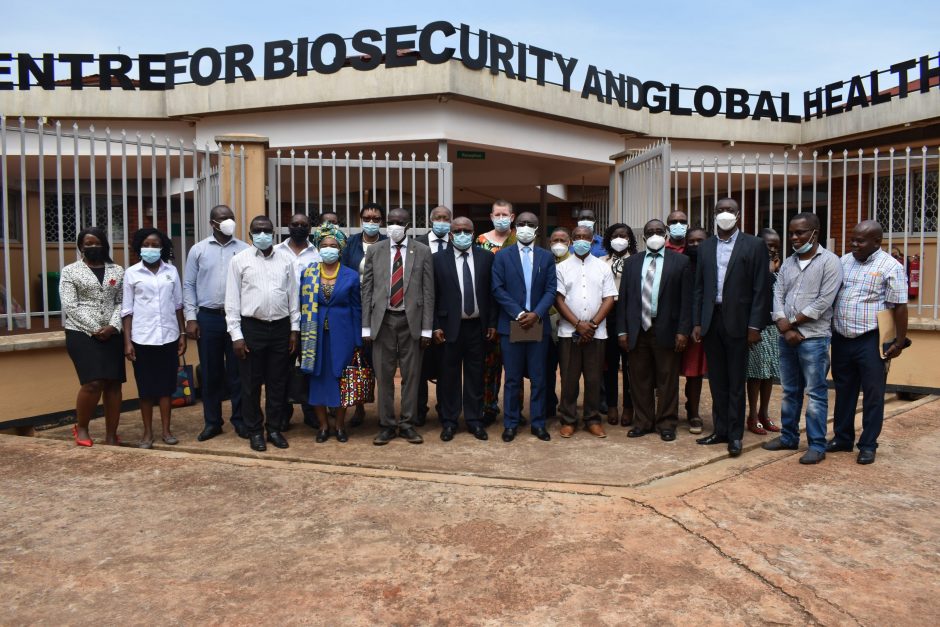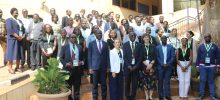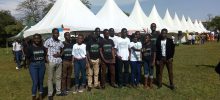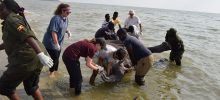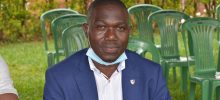WHO in an appraisal Visit to CoVAB
The World Health Organisation Regional Experts Advisory Committee on Traditional Medicine for Covid-19 Response on Monday 7th March 2022 visited the College of Veterinary Medicine, Animal Resources and Bio Security (CoVAB) to take stock of the developments in clinical trials and other efforts in the development of drugs and vaccines to address COVID 19.
The team that made a guided tour of the facilities and activities undertaken in the Centre for Bio Security and Global Health (CeBIGH) was also briefed about a number of ongoing studies.
The Head of the delegation of the WHO/REACT mission Prof. Joseph Okeibunor said the team of regional experts was at the college to take a look at the infrastructure in place, document the successes so far realised in the clinical efforts, identify gaps and to make recommendations for further support towards the ongoing efforts.
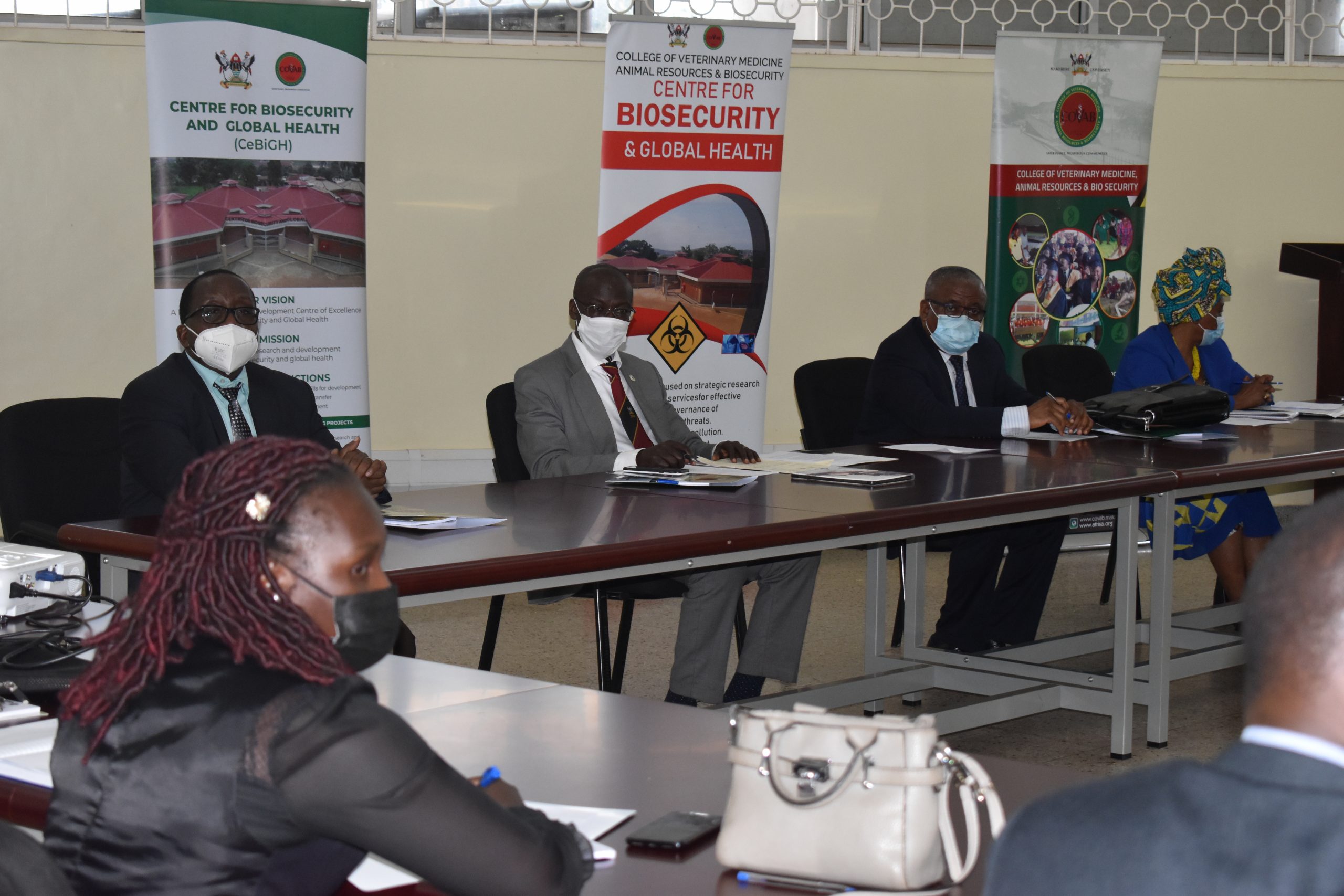
The Principal COVAB Prof Frank Mwiine with the team from WHO.
He said the visiting team would identify areas of support towards the acceleration of the processes of the development of traditional medicine to address COVID- 19.
Prof. Joseph Okeibunor was happy to note that there were already a number of successful interventions in the use of traditional medicine in the treatment of COVID 19, citing the example of the remedy in Madagascar and that the mission of the world Health organization at COVAB was to take stock of what was happening in regard to the processing of Traditional Medicine in order to ensure standardization and proper packaging to levels that were internationally satisfactory.
He said their mission in the college was to make a rapid appraisal of the available capacities in regard to internationally set standards and also come up with a plan to provide technical support in raising the national capacity in the development of Traditional medicine.
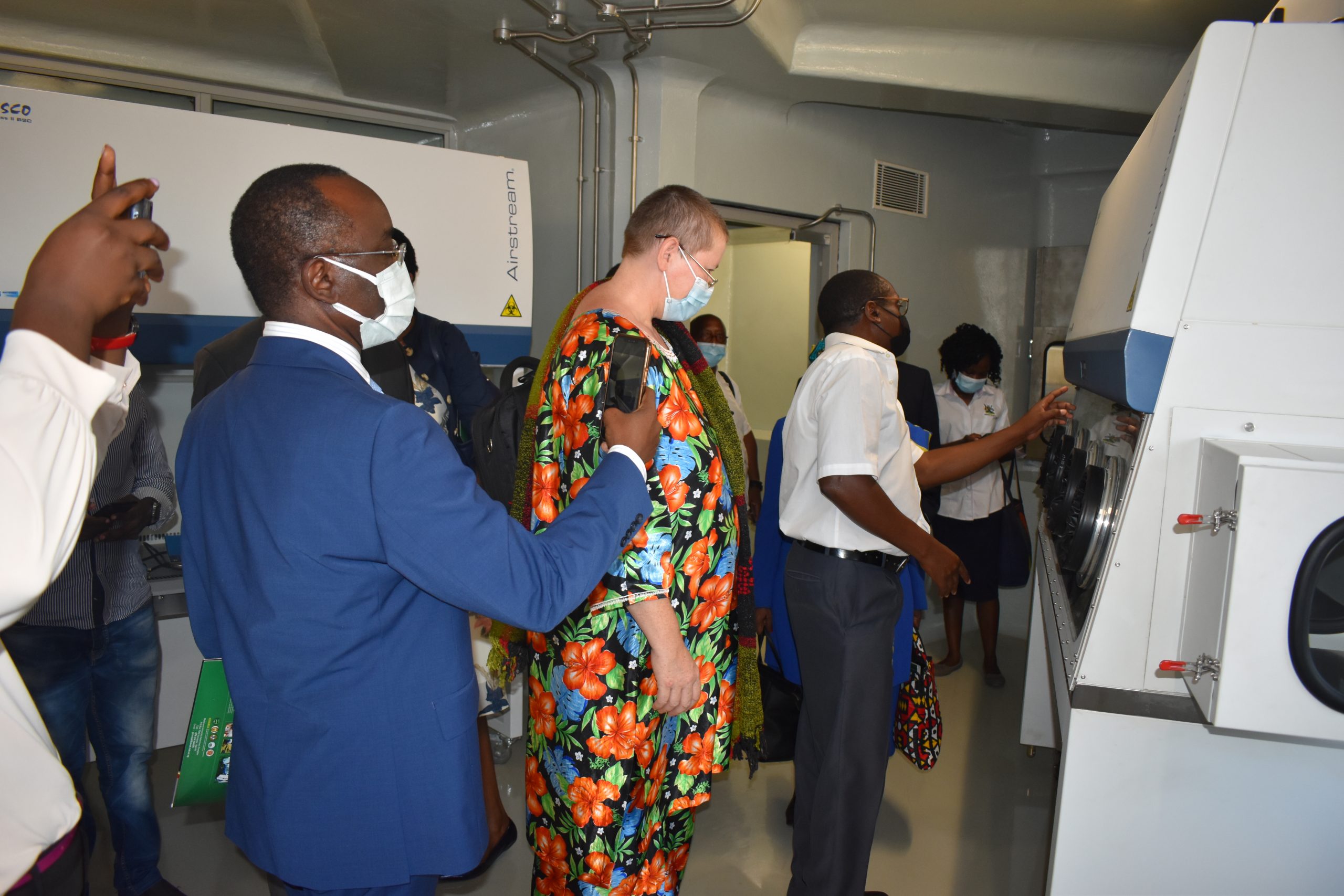
Prof Matovu Enoch guiding the team during the tour of the bio security Center.
While welcoming the team to the College, Prof. Norbert Frank Mwiine, the Principal CoVAB said Makerere University was celebrating 100 years of its existence and that this period was characterized by lots of research output in the region and globally. He said Uganda and Africa in general was naturally endowed and that in the past parents and grandparents used traditional medicine for various ailments including treatment of cattle. He urged researchers to take on the duty of identifying such knowledge and information the way it was passed on to the present generation.
He said the College had for the past sixteen years been involved in research with a number of successful outcomes as evidenced in Covidex, a product by Professor Ogwang, who was one of the beneficiaries of the programs offered at the College. He said the President of the republic of Uganda gave a go ahead to such products in order to increase the care for the people infected with COVID 19, amidst the limited number of vaccinated people and that the College was proud to be associated with the success realised.
‘In western Uganda where I grew up, I learnt how to treat animals using traditional medicine, he said adding that the ongoing research at the College is embracing ethnobotany and not purely western medicines.
The representative form the Ministry of Science, Technology and Innovation said as a Ministry, they were proud of CoVAB and that researchers at the College were some of the initial Scientists the Ministry worked with in the establishment of central laboratory facilities and drug development. She commended the contribution made by Prof. John David Kabasa as Principal Investigator who was instrumental in the implementation of this Presidential Initiative since the year 2020 that helped in nurturing the pathogen economy. ‘We needed central facilities because many institutions were not in position to set up such initiatives’ she said. She noted that the Scientists were ready for the clinical trials as well as animal trials despite the gaps identified. She said the ministry set up a number of teams of innovators some in the academia while others were out there in the communities.
In order to appreciate the positioning of traditional medicine in the College, a presentation was made about the central Laboratory Animal Research Facility (CLARF). It was explained that the process was on to establish a state of the Art animal house to include both large and small experimental animals at CoVAB for production, testing and diagnosis therapeutics.
The goal was to commercially produce biological molecules for diagnosis, treatment and control of infectious diseases as well as breed and sell lab animal services
Prof. Enoch Matovu further illustrated a number of ongoing research projects in the Centre for Bio Security and Global Health, a centre focused on strategic research. These included the Anti-Tick Vaccine development project, the Safe fish project, COVID 19 Elisa surveillance and the COVID 19 Sub Unit Vaccine among many others.
The WHO team among others comprised of Ossy M.J Kasilo, Regional Advisor for Traditional Medicine from Brazaville Congo, Prof Motlalepulan G. Matsabisa from University of Free State, South Africa.
The Visit by the team from WHO follows a number of earlier processes that started off with the Office of the President’s decision to drive 8 industrial value chains that were prioritised for development one of which was the pathogen economy or pathogen Industrial chains. One of the components of these industrial chains was in the natural products or herbal industry under the stewardship of Prof. John David Kabasa.
CoVAB was identified as a major stakeholder in the natural products Industry in Uganda and Africa. It hosted and coordinated the development of African natural herbal products, research and training network which involved a number of countries in east Africa including Uganda, Kenya, Tanzania and Malawi. Todate, The network has trained over 20 PhDs and 38 MSC Scientists.


